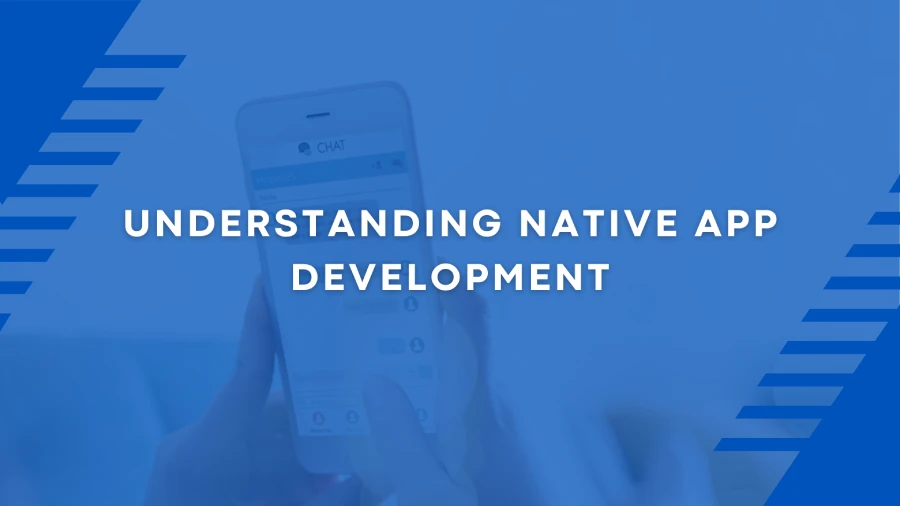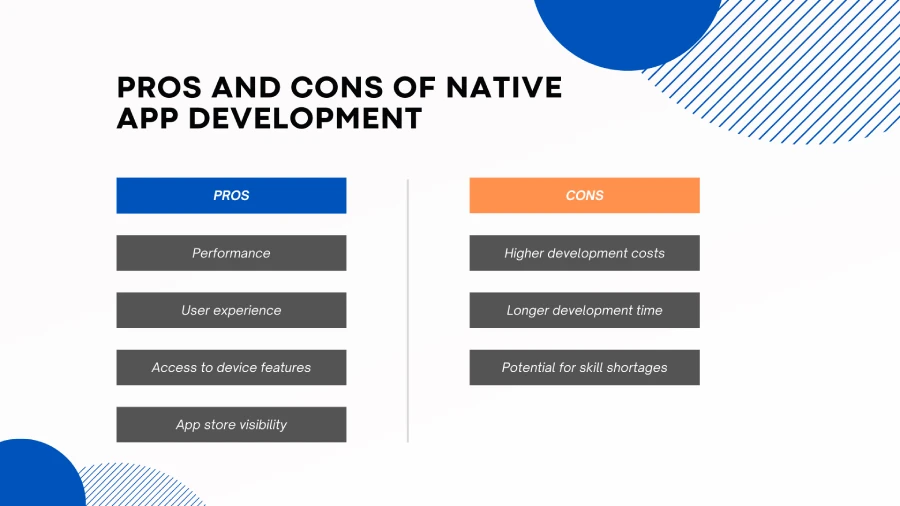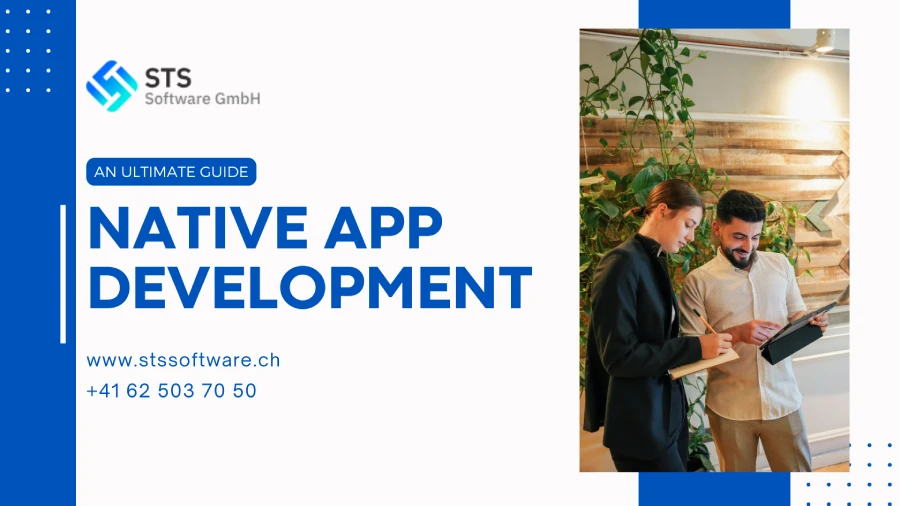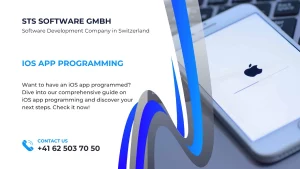In today’s fast-paced digital landscape, native app development has become a crucial strategy for businesses aiming to deliver seamless and efficient user experiences. Native apps, designed specifically for a particular platform, whether Android or iOS, leverage the full capabilities of the device’s hardware and operating system, providing unparalleled performance and user engagement. This trend is reflected in the growing market for application development software, which is projected to reach US$2.11bn in 2024, highlighting the increasing demand for innovative and high-quality native app solutions.
For businesses operating in competitive markets such as Switzerland and Germany, the decision to develop a native app is not solely based on functionality. It is also about creating a superior and reliable customer experience. Native apps offer faster load times, enhanced security, and better integration with device features, which are essential for gaining a competitive edge.
However, while native app development presents numerous opportunities, it also comes with its unique set of challenges, particularly for Swiss and German companies. These challenges include navigating stringent data privacy regulations, ensuring localization for diverse language regions, and managing higher app development costs compared to cross-platform solutions. Despite these hurdles, the rewards are significant, as a well-executed native app can lead to increased customer loyalty, higher conversion rates, and stronger brand recognition.
Want to program a native app for Android or iOS that aligns with your business goals?
Get in touch with our app experts today!
Understanding Native App Development

The term ‘native app development‘ describes the process of app development that is designed to run on specific platforms or operating systems, such as iOS or Android. These apps are built using platform-specific languages like Swift for iOS and Kotlin or Java for Android, ensuring optimal performance and seamless integration with the device’s features.
In comparison to hybrid app development and web app development, native apps offer superior user experience, speed, and access to device functionalities. Hybrid apps, developed using web technologies like HTML, CSS, and JavaScript, are wrapped in a native container, making them functional across platforms but often less optimized than native apps. Web apps, on the other hand, are accessed through browsers and do not require installation, providing greater accessibility at the cost of limited offline capabilities and slower performance.
| Aspect | Native App Development | Hybrid App Development | Web App Development |
| Platform | Specific (iOS, Android) | Cross-platform | Browser-based |
| Performance | High | Moderate | Varies (depends on browser and device) |
| Development Cost | Higher due to separate codebases | Lower (single codebase for multiple platforms) | Lowest |
| User Experience | Best (tailored to platform) | Good (but may lack platform-specific features) | Consistent but lacks native feel |
| Offline Access | Full access | Limited | Limited |
This comparison highlights the strengths and trade-offs of each approach, guiding businesses to choose the best strategy based on their objectives and target audience. If you would like to gain a deeper understanding of the distinctions between native, hybrid and web apps, we invite you to explore our comprehensive comparison guide.
Learn more: Native App vs. Hybrid App vs Web App: Choosing the Right Path for Your Project
Pros and Cons of Native App Development

Native app development offers a robust approach to building high-quality mobile applications that are tailored to specific platforms, such as iOS and Android. By developing apps natively, businesses can leverage the full potential of the operating system, ensuring top-tier app performance and an outstanding user experience. However, this method also comes with its challenges, including higher app development costs and longer timelines.
Key benefits
- Performance: Native apps deliver superior app performance due to their platform-specific design, resulting in faster load times and smoother interactions.
- User experience: Tailored to the OS, native apps provide an intuitive and seamless user experience that aligns with user expectations.
- Access to device features: Native apps can fully utilize device capabilities, such as GPS, camera, and notifications, enhancing functionality.
- App store visibility: Native apps are often prioritized in app store rankings, improving app store optimization and visibility.
Drawbacks
- Higher development costs: Developing separate codebases for each platform increases the overall app development cost.
- Longer development time: The need to program native app versions for multiple platforms leads to extended timelines.
- Potential for skill shortages: Finding experienced app developers with platform-specific expertise can be challenging, potentially delaying the project.
This balanced view of the pros and cons allows businesses to make informed decisions when choosing to invest in native app development, aligning their strategies with long-term goals.
When to Choose Native App Development

Ideal Scenarios For Developing A Native App
- High performance requirements: When your app demands maximum speed, responsiveness, and smooth interactions, native app development is essential. This is particularly crucial for AR apps, gaming, and complex data processing.
- Extensive device feature utilization: If your app relies heavily on device-specific hardware or sensors, such as the camera, GPS, or accelerometer, native app development ensures full functionality.
- Optimal user experience: Native apps deliver a seamless, intuitive user experience that aligns with platform-specific design guidelines. This makes them the best choice for apps prioritizing user interface.
- Strong app store visibility: For apps targeting specific platforms like native Android apps or native iOS apps, native development can improve app store rankings and visibility.
- Complex offline functionality: When robust offline capabilities and synchronization are required, native apps excel in delivering consistent performance.
- Security-critical applications: For apps where data privacy and security are paramount, such as financial or healthcare apps, native app development provides enhanced protection.
Key Factors To Consider For Native App Selection
- Target audience: Understanding your primary users and their preferred devices (iOS, Android, or both) helps determine the need to develop native apps.
- App complexity: The more complex the app’s features, the more suitable native development becomes.
- Budget and timeline: Be prepared for higher app development costs and longer timelines with native development.
- Development team expertise: Ensure your app development team has the necessary skills to build for both iOS and Android.
- Long-term maintenance: Factor in the resources required to maintain and update the app for each platform.
- Future scalability: Assess the app’s ability to grow and accommodate new features over time.
Native Android App Development
Native Android app development leverages the vast potential of the Android platform, which holds a significant market share worldwide. As the most widely used operating system on mobile devices, Android offers unparalleled reach and flexibility. Developers utilize tools like Android Studio, the official Integrated Development Environment (IDE) for Android, along with programming languages such as Java and Kotlin, to build powerful and responsive android apps.
Key features and benefits of Android app development include broad device compatibility, extensive customization options, and deep integration with Google services. This makes native android app development ideal for businesses aiming to reach a global audience with diverse hardware and software configurations.
However, android app development comes with its own set of challenges. The fragmented nature of the Android ecosystem means developers must consider varying screen sizes, hardware capabilities, and OS versions. Ensuring compatibility across this wide range of mobile devices can be complex and time-consuming. Additionally, maintaining optimal performance and security across different Android versions requires careful planning and testing.
Despite these challenges, the flexibility and scalability of the Android platform make it a compelling choice for many businesses. By leveraging Android Studio and languages like Java and Kotlin, developers can create robust, feature-rich apps that meet the demands of a diverse user base.
Learn more: Android App Programming: Here’s how it works
Native iOS App Development
Native iOS app development is centered around the iOS platform, which powers millions of iPhone apps and holds a significant share of the global mobile devices market. Renowned for its consistent user experience and security features, iOS is a top choice for businesses targeting high-value users. Apple’s operating system is known for its strong brand loyalty and premium app ecosystem, making iOS app development a strategic investment.
Developers use Xcode, Apple’s official Integrated Development Environment (IDE), to build native iOS apps. They primarily write code in Swift, Apple’s modern programming language, or Objective-C, the legacy language still used for many existing apps. These tools and languages enable the creation of high-performance, feature-rich apps that align perfectly with iOS’s design and functionality standards.
Key features and benefits of iOS app development include seamless integration with Apple’s ecosystem, strong app store visibility, and superior performance on Apple devices. Native iOS apps are also known for their exceptional user experience due to their adherence to platform-specific guidelines.
However, native iOS app development presents some challenges. The closed nature of the iOS platform means strict adherence to Apple’s guidelines, which can limit customization. Additionally, the cost of developing and maintaining iOS apps is generally higher. Especially when targeting multiple device types and OS versions. Despite these challenges, the benefits of targeting a dedicated and high-spending user base often outweigh the drawbacks.
Learn more: iOS App Programming: Here’s How It Works
Programming A Native App For Swiss And German Businesses
Native app development presents unique opportunities and challenges for Swiss and German businesses. With a strong focus on quality, data privacy, and innovation, these markets require a tailored approach when you choose to program native apps.
Data privacy is a paramount concern in both Switzerland and Germany, governed by regulations like GDPR and the Swiss Federal Data Protection Act. Ensuring compliance with these regulations is crucial when you develop native apps for these markets, particularly for businesses handling sensitive user data.
Multilingual app development is another key consideration. Catering to diverse language needs, including German, French, and Italian, is essential for broad user engagement. Moreover, seamless integration with existing systems, such as ERP and CRM, ensures that new apps align with established workflows, enhancing overall efficiency.
Swiss and German businesses have seen significant success with native app development. For example, apps like SBB Mobile and N26 showcase the potential for innovation and user satisfaction. By following best practices, such as focusing on data security, localization, and user experience, companies can create powerful apps that resonate with their audience.
Partnering with a specialized app development agency is advisable for Swiss and German businesses aiming to create their own app. Such agencies understand the regional nuances and can help navigate the complexities of native app development, ensuring that the final product meets both local regulations and market expectations.
Choosing the Right App Development Agency for Your Native App
Selecting the ideal app development agency is crucial for successful native app development. To ensure a seamless experience, businesses should consider several key factors when choosing a partner.
- Local presence is important, especially for businesses that require close collaboration and understanding of regional markets. An agency with a local office or strong ties to your area can provide valuable insights and more responsive service.
- Expertise and portfolio are critical indicators of an agency’s ability to deliver high-quality results. Reviewing their past projects, especially in native app development, helps gauge their technical skills and industry experience. Look for an app programmer with a proven track record in developing robust and innovative native apps.
- Data privacy and security should be a top priority, particularly for businesses handling sensitive information. Ensure that the agency is well-versed in the latest data protection regulations and has stringent security protocols in place.
- Finally, consider the cost and pricing structure. While it’s essential to stay within budget, remember that quality often comes at a price. Discuss the app development cost upfront, and ensure the agency provides transparent pricing. Balancing affordability with expertise will help you develop your own app without compromising on quality.
By evaluating these factors, you can select the right app development agency to bring your native app vision to life.
How Much Does It Cost To Develop A Native App?
Understanding the native app development cost and time estimation is vital for businesses planning to build a high-quality app. Several factors influence these estimates, including app complexity, platform choice, design requirements, and the experience of the development team. Apps with advanced features, such as AR capabilities or extensive backend integration, will require more time and resources, driving up the app development cost.
In Switzerland and Germany, the average cost of native app development ranges from €50,000 to €150,000, depending on the scope and features. High labor costs and strict data privacy regulations contribute to these higher figures. But they also ensure top-tier quality and compliance.
To manage costs effectively, it’s crucial to set a clear budget, prioritize essential features. Moreover, you need to work with an experienced development team that can provide accurate estimates. Regular communication with your development team can help avoid scope creep, keeping the project on track both financially and time-wise.
By considering these factors, you can better navigate the complexities of native app development while optimizing both time and cost.
Emerging Trends In Native App Development
The field of native app development is rapidly evolving, with several cutting-edge technologies shaping the future of mobile applications. Keeping up with these emerging trends can provide businesses with a competitive edge and enhance user experiences.
Augmented Reality (AR) is transforming how users interact with apps by overlaying digital information onto the real world. AR apps are increasingly popular in sectors like gaming, retail, and education. These apps offer immersive and interactive experiences that blend the virtual with the physical.
Virtual Reality (VR) is another significant trend, offering fully immersive environments that can simulate real or imagined spaces. VR apps are making waves in gaming, training simulations, and virtual tours. This type of app provides users with an engaging and immersive experience that goes beyond traditional app interfaces.
Artificial Intelligence (AI) is revolutionizing native app development by enabling smarter and more adaptive functionalities. From personalized recommendations to natural language processing, AI software development is enhancing app capabilities and creating more intuitive and responsive user experiences.
By embracing these trends, businesses can leverage advanced technologies to develop innovative and engaging native apps that stand out in the competitive mobile market.
Conclusion
In summary, native app development offers significant advantages for businesses looking to create high-performance, feature-rich mobile applications. By understanding key elements such as development costs, time estimation, and emerging trends like AR, VR, and AI, you can make informed decisions that align with your business goals.
The importance of native app development cannot be overstated. It enables businesses to provide superior user experiences, leverage advanced technologies, and ensure robust performance across platforms. Investing in native app development can lead to greater user engagement, higher app store visibility, and ultimately, increased business success.
If you’re considering native app development for your business, now is the time to start planning. Assess your needs, set clear goals, and collaborate with experienced developers to bring your app vision to life. Embracing native app development can set you apart in the competitive mobile market and drive long-term growth.



